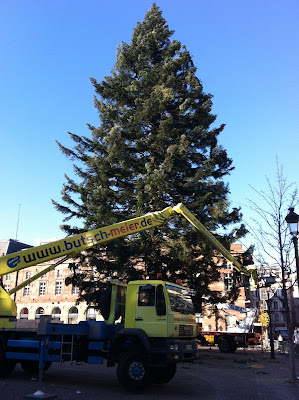ENGLISH
A small article in a recent newspaper caught my eye; not so
much for its content, but for what it says about the cultural gulf between
France and Canada.
Apparently, Bricorama, a French DIY store, had been opening
on Sundays in the Paris area. Its workers' trade union therefore took the store
to court (there are strict laws about opening on Sundays in France) and
demanded that the staff should not suffer as a consequence. The demand not only
stated that staff should receive the same salary (despite no longer working
Sundays), but that they should also benefit from a "thirteenth month"
of pay (i.e.: an extra month's bonus, a relatively common practice in France).
To boot, the head office is set to be fined €37 million, or roughly three times
its annual profit. The net result? The company may have to lay off some 500
employees -- and possibly close a number of its stores -- to make the books
balance. What's more, rival DIY companies also opening on Sundays are likely to
face a similar fate.
When we moved back to France, the limited opening hours were
one of the biggest cultural shocks. In Canada, like in the US and even the UK,
there is an around-the-clock shopping culture. Many supermarkets are open all
through the night, or at least until midnight. All stores open on Sundays, and
we even had a local fruit and veg market that stayed open 24 hours a day from
spring to autumn. Just in case you ran out of tomatoes while making a salad at
3am.
In France, meanwhile, Sundays are sacred. Even in Paris,
most stores remain closed, although local food shops are usually open in the
mornings, so you can buy fresh ingredients for the traditional Sunday family
lunch. Especially outside Paris, many smaller shops -- and nearly all French
administration offices -- close at lunchtimes, so it's tricky to get much done in
your lunchtime. And then, of course, the majority of storekeepers take a good
month off in August, which means it's sometimes a challenge to get a fresh baguette
in the summer!
All this would be alien to most Montrealers. After all, Sunday is the day when moat people
finally get around to doing their DIY.
FRANCAIS
Mon œil a été attiré
par un brevet dans un des journaux gratuits récemment; pas tellement pour son
contenu, mais pour ce que cela en disait sur l'écart culturelle entre la France
et le Canada.
Il semble que les
magasins Bricorama avaient pris l'habitude d'ouvrir ses portes le dimanche dans
la région parisienne. Le travail dominical étant très contrôlé en France, les
syndicats sont intervenus, demandant que le magasin respecte la fermeture le dimanche, que ses salariés ne soient pas impactés et même qu'ils obtiennent un
treizième mois (un mois de salaire en bonus : une pratique assez courant en
France). En plus, pour n'avoir pas respecté la loi sur l'ouverture dominicale,
Bricorama s'est vu prendre une amende de 37 million d'euros, soit trois fois
plus que le résultat net du groupe par an. Ce qui va probablement obliger
Bricorama à libérer 500 salariés et même fermer trois magasins.
Après notre
retour en France, un des plus grands chocs culturels était la nature limitée
des heures d'ouverture. Au Canada, tout comme aux Etats-Unis et même à un
moindre degré en Grande-Bretagne, il existe une culture 24 heures. Beaucoup de
supermarchés sont ouverts toute la nuit, ou au moins jusqu'à minuit. Les
magasins sont tous ouverts le dimanche, et nous avions même un petit marché en
plein air qui vendait les fruits et légumes 24 heures par jour du printemps
jusqu'à l'automne. On se sait jamais si on aurait pas besoin de tomates en
préparant une salade à 3h du matin...
En France, le
dimanche est sacré. Même à Paris, la plupart des magasins ferment, avec quelques
marchands locaux ouverts exclusivement le matin pour ceux qui veulent des
ingrédients frais pour le traditionnel repas de midi en famille. A l'extérieur de Paris, les petits magasins --
et la plupart de l'administration française -- ferment ses portes entre midi et
deux, donc pas facile de s'occuper de certaines choses à l'heure de la pause.
Et la majorité des propriétaires de magasin ferment pendant 3 ou 4 semaines au
mois d'aout pour partir en vacances.
Tout ça serait
impensable pour les Québécois. Après tout, le dimanche, c'est souvent le jour
quand on trouve du temps pour faire son bricolage.






